Scanning Documents and Sending the Scanned Data to a Folder
To send the data of a scanned original to a shared folder on a computer, create the shared folder on the computer in advance and register the destination folder in the address book.
You also need to configure the settings for connecting to the network from the machine.
You can add a folder destination in the address book easily using Scan to Folder Helper.
Specifying the Destination of Send to Folder Using the Scan to Folder Helper App
![]()
Using the SMB 3.0 protocol, you can save a file in the folder that was configured individually to apply encryption.
The scanned file can be also saved to an FTP server.
Registering the Destination Folder to Use for Send to Folder
Printing the Check Sheet
Print the check sheet below to make a note of the setting values regarding the destination computer.
Check sheet | ||
|---|---|---|
No. | Items to check (example of the setting values) | Setting entry column |
[1] | Computer name | |
DHCP server enable/disable setting | ||
IP address | ||
[2] | Domain name/workgroup name | USERDNSDOMAIN:   USERDOMAIN:   |
Computer login user name | ||
[3] | Computer login password | |
[4] | Shared folder name on computer | |
Confirming the Computer Information (Windows)
Confirm the name, IP address, and other information of the computer used to create a shared folder, and write down the information on the check list.
![]() Click [Start] on the computer and click [Windows System]
Click [Start] on the computer and click [Windows System]  [Command Prompt].
[Command Prompt].
![]() Enter "ipconfig/all" and press the [Enter] key.
Enter "ipconfig/all" and press the [Enter] key.
![]() Check the computer name, enable/disable status of the DHCP server and IP address, and write down the information in [1] on the check sheet.
Check the computer name, enable/disable status of the DHCP server and IP address, and write down the information in [1] on the check sheet.
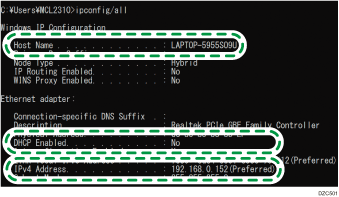
When the screen shown above is displayed, fill in the sheet as follow:

![]() Enter "set user" and press the [Enter] key.
Enter "set user" and press the [Enter] key.
Enter a space between "set" and "user".
![]() Check the domain name, workgroup name and login user name, and write down the information in [2] on the check sheet.
Check the domain name, workgroup name and login user name, and write down the information in [2] on the check sheet.
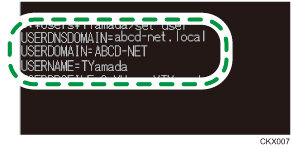
When the screen shown above is displayed, fill in the sheet as follow:

"USERDNSDOMAIN" is not displayed when the login user who executed the command is a local user.
![]() Check the login password on the computer, and write down the information in [3] on the check sheet.
Check the login password on the computer, and write down the information in [3] on the check sheet.
The required information on the computer is confirmed. Now create a shared folder on your computer and specify the access permissions of the folder.
![]()
Depending on the operating system or security settings, it might be possible to specify a user name that does not have a password assigned. However, we recommend that for greater security you select a user name that has a password.
Creating a Shared Folder (Windows)
Create a shared folder on the Windows Desktop and specify the access permissions of the folder.
![]()
If you are creating a shared folder for the first time on this computer, you must enable the file sharing function. For details, see Windows Help.
To register a shared folder in the machine's address book, you need the computer's IP address or computer name, and the user name and password of a user who has access permissions for the shared folder.
![]() Log on to Windows as a user with administrative privileges.
Log on to Windows as a user with administrative privileges.
![]() Create a new folder in Windows Explorer and write down the folder name in [4] on the check sheet.
Create a new folder in Windows Explorer and write down the folder name in [4] on the check sheet.
![]() Right-click the created folder, and then click [Properties].
Right-click the created folder, and then click [Properties].
![]() On the [Sharing] tab, click [Advanced Sharing].
On the [Sharing] tab, click [Advanced Sharing].
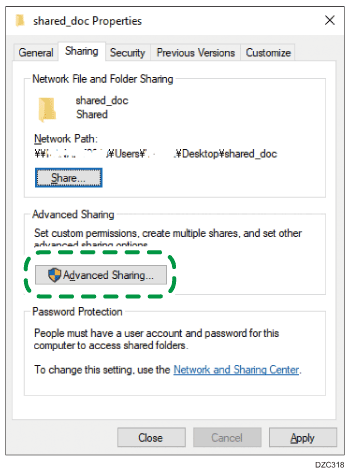
![]() Select the [Share this folder] check box, and then click [Permissions].
Select the [Share this folder] check box, and then click [Permissions].
After completing the procedure, remove Everyone (unspecified user), and then add a user allowed access the folder. The user whose information is written down on the check sheet is used in the example shown below.
![]() Select [Everyone] under [Group or user names], and then click [Remove].
Select [Everyone] under [Group or user names], and then click [Remove].
![]() Click [Add]
Click [Add]  [Advanced]
[Advanced]  [Object Types].
[Object Types].
![]() Select [Users], and then click [OK].
Select [Users], and then click [OK].
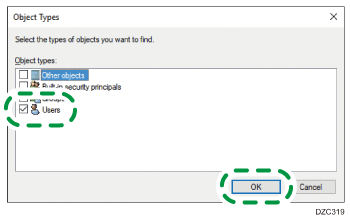
![]() Click [Locations], select the name of the domain or work group the user belongs to ([2] on the check sheet) and then click [OK].
Click [Locations], select the name of the domain or work group the user belongs to ([2] on the check sheet) and then click [OK].
![]() Click [Find Now].
Click [Find Now].
![]() From the Search results, select the login user name of the computer to be added ([2] on the check sheet) and then click [OK].
From the Search results, select the login user name of the computer to be added ([2] on the check sheet) and then click [OK].
When you cannot find a specific user, click [Columns], or right-click the [Search results] field, select [Select Column], and then add [Logon Name] or [Logon Name (pre-Windows 2000)] from the [Available columns] list.
![]() Click [OK].
Click [OK].
![]() Select the added user, and then select the [Allow] check box under [Permissions].
Select the added user, and then select the [Allow] check box under [Permissions].
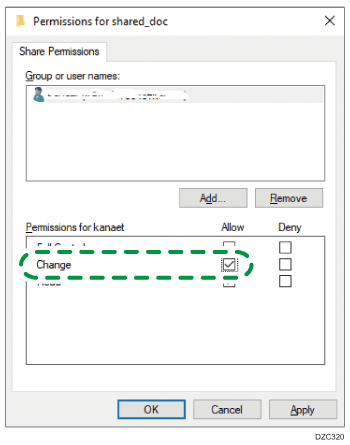
![]() Click [OK] to close all windows.
Click [OK] to close all windows.
The access permissions on the folder have been successfully configured. If you want to specify access permissions for the folder to allow other users or groups to access the folder, configure the folder as follows:
Right-click the created folder and then click [Properties].
Click [Edit...] on the [Security] tab.
Click [Add]
 [Advanced].
[Advanced].Select [Object Types] or [Locations] and click [Find Now].
Select the user or group to assign permissions and click [OK].
Click [OK].
Select the added user, and then select the [Allow] check box under [Permissions].
Click [OK] to close all windows.
Confirming the Computer Information (macOS)
Confirm the name of the computer used to create the shared folder, login user name and other settings and write down the information on the check list.
![]() Log on to macOS as a user with administrative privileges.
Log on to macOS as a user with administrative privileges.
![]() Click the Apple menu.
Click the Apple menu.
![]() Click [About This Mac].
Click [About This Mac].
![]() Click [System Report].
Click [System Report].
![]() Click [Software] on the left pane and write down the displayed computer name in [1] and the user name in [2] on the check sheet.
Click [Software] on the left pane and write down the displayed computer name in [1] and the user name in [2] on the check sheet.
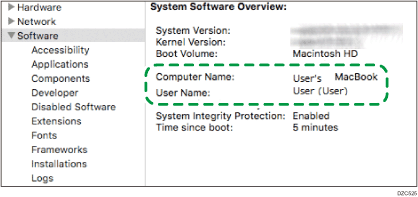
When the screen shown above is displayed, fill in the sheet as follow:

![]() Click the Apple menu and select [System Preferences].
Click the Apple menu and select [System Preferences].
![]() In [Network], click [Ethernet] or [Wi-Fi] and write down the displayed IP address in [1] on the check sheet.
In [Network], click [Ethernet] or [Wi-Fi] and write down the displayed IP address in [1] on the check sheet.
The required information on the computer is configured. Now create a shared folder.
![]()
Depending on the operating system or security settings, you might be able to specify a user name that does not have a password assigned. However, we recommend that you select a user name that has a password.
Creating a Shared Folder (macOS)
Create a shared folder and specify the access permissions of the folder.
![]() Create a new folder and write down the folder name in [4] on the check sheet.
Create a new folder and write down the folder name in [4] on the check sheet.
![]() Click the Apple menu and select [System Preferences].
Click the Apple menu and select [System Preferences].
![]() Click [Sharing], select the [File Sharing] check box and then click [Options].
Click [Sharing], select the [File Sharing] check box and then click [Options].
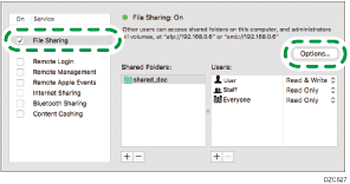
![]() Select the check boxes of [Share files and folders using SMB] and the user account to use for file sharing and then click [Done].
Select the check boxes of [Share files and folders using SMB] and the user account to use for file sharing and then click [Done].
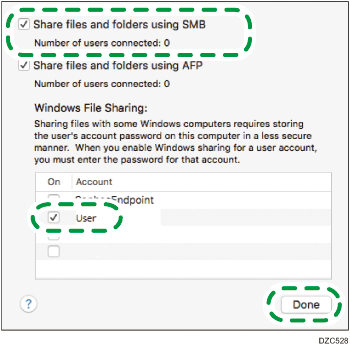
When the [Authentication] screen is displayed, enter the password of the selected account and then click [Done].
![]() Click [
Click [![]() ] below [Shared Folders] on the [Sharing] screen.
] below [Shared Folders] on the [Sharing] screen.
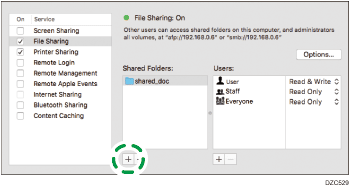
![]() Specify the folder created in Step 1 and click [Add].
Specify the folder created in Step 1 and click [Add].
![]() Select the folder added in Step 6 and confirm that the permission of the user to access the folder is set to "Read & Write".
Select the folder added in Step 6 and confirm that the permission of the user to access the folder is set to "Read & Write".
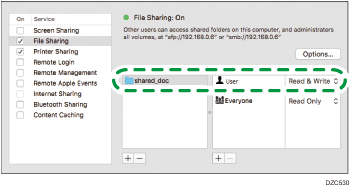
![]()
To register a shared folder in the machine's address book, you need the computer's IP address, and the user name and password of a user who has access permissions for the shared folder.
Registering the Created Shared Folder in the Address Book
This section describes the procedure for registering a shared folder created in Windows using the information on the check sheet as an example.
![]() Press [Address Book] on the Home screen.
Press [Address Book] on the Home screen.
![]() Press [Register] on the address book screen.
Press [Register] on the address book screen.
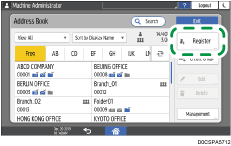
The items displayed on the screen vary depending on the version of RICOH Always Current Technology that is implemented on the machine.
![]() Enter the information of the destination in the input boxes displayed on the [Name] tab, and select the title to classify the destination.
Enter the information of the destination in the input boxes displayed on the [Name] tab, and select the title to classify the destination.
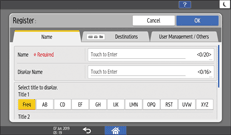
![]() Press the [Destinations] tab, and then press [Folder].
Press the [Destinations] tab, and then press [Folder].
![]() Specify the network path to the shared folder in "Path".
Specify the network path to the shared folder in "Path".
Entering the path name manually
If the computer name is "YamadaPC" ([1] on the check sheet) and the shared folder name is "shared_doc" ([4]), enter as follows:
\\YamadaPC\shared_doc
Selecting a folder from the list
Enter the IP address or host name of the computer on which to search for a shared folder, press [Browse Network], and then select the destination folder.
![]() Under [Folder Authentication Info], select [Specify Other Authentication Information] and then enter the name and password of the login user who will access the shared folder.
Under [Folder Authentication Info], select [Specify Other Authentication Information] and then enter the name and password of the login user who will access the shared folder.
![]() Press [Connection Test]
Press [Connection Test] [Exit].
[Exit].
When no connection is established, check the message that appears.
![]() Press [OK].
Press [OK].
![]() Press the [User Management / Others] tab and specify the settings as required.
Press the [User Management / Others] tab and specify the settings as required.
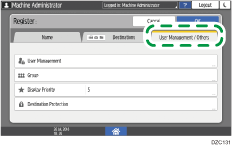
![]() Press [OK].
Press [OK].
![]() Press [Home] (
Press [Home] ( ) after specifying the settings.
) after specifying the settings.
![]()
The connection test may take time.
Even if the connection test was successful, the machine may fail to transfer the file if you do not have write privileges for the file or there is not enough free hard disk space.
If the client computer has a fixed IP address assigned to it, you can specify the IP address manually by including it in the path name of the destination folder. For example, if the IP address is "192.168.1.191" and the shared folder name is "user", enter "\\192.168.1.191\user" as the path.
When the specified destination is updated using the Central Management function, the spooled documents are sent to the destination after updating.
Basic Procedure for Performing Send to Folder
![]() Press [Scanner] on the Home screen.
Press [Scanner] on the Home screen.
![]() Select [To Folder] on the scanner screen.
Select [To Folder] on the scanner screen.
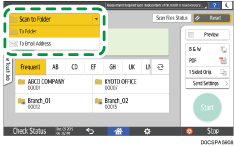
![]() Place the original on the scanner.
Place the original on the scanner.
![]() Press [Send Settings] and configure the scan settings according to the purpose of the scanned data.
Press [Send Settings] and configure the scan settings according to the purpose of the scanned data.
![]() Press
Press  , select [Search Address Book] or [Specify by Reg. No.] and then specify the shared folder that is registered in the address book.
, select [Search Address Book] or [Specify by Reg. No.] and then specify the shared folder that is registered in the address book.
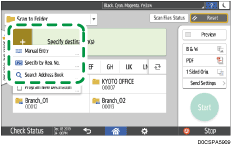
To enter the information manually, press
 , and select [Manual Entry]. Select SMB as the protocol and enter the required information.
, and select [Manual Entry]. Select SMB as the protocol and enter the required information.To specify the destination again, press
 .
.
![]() Press [Start].
Press [Start].
![]()
If any of the machine's security functions are enabled, select the destination from the registered folder only when you send files by Scan to Folder.
If the firewall of an antivirus program is active, you may not be able to specify a shared folder on the computer as a folder destination. If this is the case, see the antivirus program's Help.
If Windows firewall is active and you cannot specify a shared folder on the computer as a folder destination, the machine may be able to communicate with the computer by changing the exceptions of the Windows firewall. For details, see Windows Help.
After scan files are sent, the destination and file name fields will be automatically cleared. If you want to preserve the information in these fields, contact your local dealer.
When the specified destination is updated using the Central Management function, the spooled documents are sent to the destination after updating.
